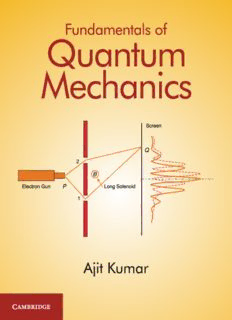Table Of ContentFundamentals of Quantum Mechanics
The book discusses fundamental concepts of quantum mechanics, including the state of a
quantum mechanical system, operators, superposition principle and measurement
postulate. The notion of an operator and the algebra of operators is introduced with the
help of elementary concepts of mathematical analysis. The mathematical tools developed
here will help resolve the difficulties encountered in classical physics while trying to
explain the experimental results involving atomic spectra and other phenomena. The
differential equations that arise while solving eigenvalue problems are solved rigorously,
to make the text self-sufficient. The solutions are then physically interpreted and
explained.
The book covers modern algebraic language of quantum mechanics, wherein the
fundamental concepts and methods of solutions are translated into the algebraic
formalism and compared with the earlier simpler approach. The text offers solved
examples and homework problems to help students in solving practical problems of
physicsrequiringquantummechanicaltreatment.
Ajit Kumar is a Professor at the Department of Physics, Indian Institute of Technology,
New Delhi. He is a Fellow of the Alexander von Humboldt Foundation, Bonn, Germany
since1987.ArecipientoftheTeachingExcellenceAwardfromI.I.T.Delhi,hehasbeen
teaching the core subjects of theoretical physics including quantum field theory, group
theoryanditsapplications,andgeneraltheoryofrelativityforthepast34years.Hiscurrent
research is related to the problems of nonlinear optics, solution of nonlinear Schro¨dinger
equationinnonlinearopticalmedia,fiber-opticsolitonsandtheirswitchingdynamicsand
electromagneticwavepropagationinmetamaterials.
Fundamentals of Quantum Mechanics
Ajit Kumar
UniversityPrintingHouse,CambridgeCB28BS,UnitedKingdom
OneLibertyPlaza,20thFloor,NewYork,NY10006,USA
477WilliamstownRoad,PortMelbourne,VIC3207,Australia
314to321,3rdFloor,PlotNo.3,SplendorForum,JasolaDistrictCentre,NewDelhi110025,India
79AnsonRoad,#06–04/06,Singapore079906
CambridgeUniversityPressispartoftheUniversityofCambridge.
ItfurtherstheUniversity’smissionbydisseminatingknowledgeinthepursuitof
education,learningandresearchatthehighestinternationallevelsofexcellence.
www.cambridge.org
Informationonthistitle: www.cambridge.org/9781107185586
(cid:2)c AjitKumar2018
Thispublicationisincopyright. Subjecttostatutoryexception
andtotheprovisionsofrelevantcollectivelicensingagreements,
noreproductionofanypartmaytakeplacewithoutthewritten
permissionofCambridgeUniversityPress.
Firstpublished2018
PrintedinIndia
AcataloguerecordforthispublicationisavailablefromtheBritishLibrary
ISBN978-1-107-18558-6Hardback
ISBN978-1-108-46593-9Paperback
Additionalresourcesforthispublicationatwww.cambridge.org/9781107185586
CambridgeUniversityPresshasnoresponsibilityforthepersistenceoraccuracy
ofURLsforexternalorthird-partyinternetwebsitesreferredtointhispublication,
anddoesnotguaranteethatanycontentonsuchwebsitesis,orwillremain,
accurateorappropriate.
Dedicatedtomyparents
Contents
Figures xi
Tables xiii
Preface xv
Chapter1: Introduction 1
1.1 TheBlackbodyRadiation 2
1.2 ThePhotoelectricEffect 5
1.3 TheBohrModelofanAtom 7
1.4 TheComptonEffect 8
HomeworkProblems 12
Chapter2: ThePostulatesofQuantumMechanics 13
2.1 SpecificationofState. StatisticalInterpretation 14
2.2 ObservablesandOperators 18
2.3 HermitianOperators 19
2.4 AlgebraofOperators 27
2.5 TheSchro¨dingerEquation 32
2.6 Time-independentPotentialsandtheStationaryStates 34
2.7 MeasurementandCompatibleOperators 36
HomeworkProblems 51
Chapter3: One-dimensionalProblems 56
3.1 BoundandScatteringStates 57
3.2 TheFreeParticleSolution 58
3.3 ParticleinanInfinitePotentialWell 61
3.4 DiscontinuousPotentialsandtheDifferentiabilityoftheWaveFunction 67
3.5 ConservationofProbabilityandtheContinuityEquation 72
vii
viii Contents
3.6 SymmetricPotentialandEvenandOddParitySolutions 78
3.7 ParticleinaFiniteSquareWellPotential 81
3.8 PotentialBarrierandTunneling 88
3.9 One-dimensionalHarmonicOscillator 94
3.10 Heisenberg’sUncertaintyRelation 101
3.11 Quantum–ClassicalCorrespondenceandEhrenfest’sTheorem 109
3.12 PeriodicPotentials,Bloch’sTheoremandEnergyBands 113
HomeworkProblems 119
Chapter4: AlgebraicFormulationofQuantumMechanics 124
4.1 LinearVectorSpaces 124
4.2 DiracNotation 128
4.3 HilbertSpace 136
4.4 ObservablesandOperators 138
4.5 MatrixRepresentationofOperators 141
4.6 HermitianandUnitaryOperators 146
4.7 ChangeofBasisandUnitaryTransformations 155
4.8 TheProjectionOperator 158
4.9 CoordinateandMomentumRepresentationsoftheStateVectorandthe
Schro¨dingerEquation 161
4.10 BasicPostulatesofQuantumMechanics 168
4.11 GeneralizedHeisenbergUncertaintyRelation 171
4.12 Time-evolutionOperatorandPicturesofQuantumMechanics 175
4.13 AlgebraicTreatmentofOne-dimensionalHarmonicOscillator 179
HomeworkProblems 185
Chapter5: QuantumMechanicsinThreeSpatialDimensions 187
5.1 Three-dimensionalSchro¨dingerEquationinCartesianCoordinates 187
5.2 TheFreeParticleSolutioninCartesianCoordinates 189
5.3 TheInfiniteRectangularWellPotential 191
5.4 Schro¨dingerEquationinSphericalCoordinates 192
5.5 SphericallySymmetricPotentialsandSeparationofVariables 194
5.6 SolutionoftheAngularPartoftheSchro¨dingerEquationinSpherical
Coordinates 195
5.7 SolutionoftheRadialPartoftheSchro¨dingerEquationinSpherical
Coordinates 197
5.8 TheFreeParticleSolutioninSphericalCoordinates 199
5.9 TheInfiniteSphericalWellPotential 201
Description:This book is a comprehensive text in the field of quantum mechanics, covering fundamental concepts including the state of a quantum mechanical system, operators, superposition principle and measurement postulate. The notion of an operator and the algebra of operators are introduced with the help of

